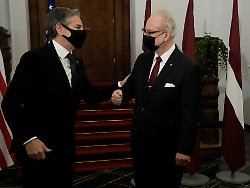Tuesday, November 30th, 2021
Deployment near Ukraine
Blinken and Maas warn Moscow
Russia has gathered more than 100,000 soldiers on the border with Ukraine. This is causing unrest not only in Kiev, but also in Riga. The NATO foreign ministers meet there. Maas and Blinken warn Moscow.
Germany and the US have warned Russia against an attack on Ukraine. “Russia would have to pay a high price for any form of aggression,” said the acting Federal Foreign Minister Heiko Maas during consultations with NATO colleagues in the Latvian capital Riga. US Secretary of State Antony Blinken said “any new aggression would have serious consequences”.
The background to the statements of the politicians are the findings of NATO, according to which Russia has again concentrated unusually large troop contingents and modern weapons near the border with Ukraine. “Russia’s military activities on the border with Ukraine give us cause for great concern,” commented the acting SPD politician Maas. Honest and sustainable steps towards de-escalation that only lead through discussions are now important. “I never tire of stressing that the door to such talks remains open for Russia,” he added.
NATO Secretary General Jens Stoltenberg also described the situation as worrying and called Russia’s foreign policy action “aggressive”. Latvia’s Foreign Minister Edgars Rinkevics said recent events were reminders that Russia remained a threat. The Ukrainian Foreign Minister Dmytro Kuleba spoke the day before in Kiev about 115,000 Russian soldiers on the common border.
New economic sanctions conceivable
Maas and Blinken left open what a NATO reaction to further aggression by Russia against Ukraine might look like. For example, tough new economic sanctions by the alliance states are conceivable. Military intervention in the conflict is considered unlikely because of the risk of a major war. It is unclear what the reasons for the massive Russian troop deployment near Ukraine are. The Moscow government claims that Russia poses no threat, arguing that it can move troops on Russian territory at its own discretion.
Russia’s Foreign Minister Sergei Lavrov once again criticized the military presence of Western states on the Russian border. It is a fact that countries are bringing troops and military equipment in large numbers from overseas “to our borders (…) and the United States has circled us on all sides with its military bases”. These “facts” are “most likely known to every schoolchild,” he said, according to the Tass state agency. Nevertheless, hysteria is constantly being fueled.
British Foreign Secretary Liz Truss said on such allegations that any allegation that NATO was provoking the Russians was obviously wrong. The alliance is based on the principle of defense and not the principle of provocation. She warned Russia against making a “strategic mistake” with regard to Ukraine. Meanwhile, it is also conceivable that the Russian troop deployment is linked to the NATO meeting in Latvia. For the first time, a meeting of NATO foreign ministers will be organized in the ally that borders Russia. Latvia and the other two Baltic states, Estonia and Lithuania, joined the alliance in 2004 despite strong criticism from Moscow.
Afghanistan should be worked up
On the question of whether the military alliance expects Moscow to want to further destabilize Ukraine, NATO Secretary General Stoltenberg recently pointed out that Russia had already shown in the annexation of the Ukrainian Black Sea peninsula of Crimea and in supporting the separatists in the eastern Ukrainian Donbass region that it has the will and the ability to use military force.
In addition to the situation in the east of the alliance, the two-day NATO deliberations will also focus on ongoing work on a new strategic concept for the alliance and on dealing with the debacle in Afghanistan. “NATO was the first international organization to thoroughly analyze its role in Afghanistan in an internal process. This is an important milestone in the comprehensive review of the international community’s engagement in Afghanistan and it is crucial for us to draw the necessary lessons,” said Maas the topic. This also involves the question of strategic patience.
In Afghanistan, the Taliban regained power shortly after the end of the NATO military presence in the country. The aim of the almost two decades of operation was actually to prevent that. Before that, the Taliban had given shelter to international terrorism. This is how the attacks that hit the United States on September 11, 2001, were prepared in Afghanistan.
